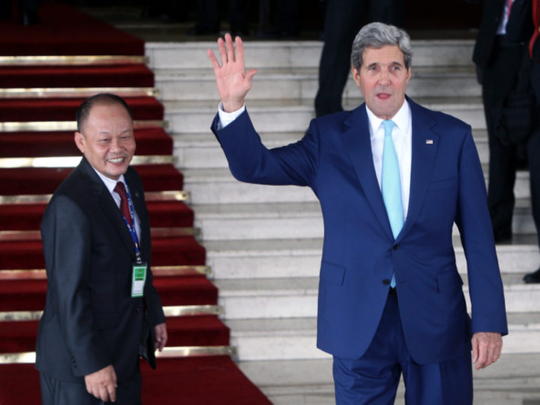
Jakarta: US Secretary of State John Kerry on Monday visited Indonesia, home to the world’s biggest Muslim population, to press Southeast Asian nations to step up efforts in the fight against Daesh.
Kerry was among foreign dignitaries in Jakarta for the inauguration of President Joko Widodo, a former furniture exporter who is the first leader of the world’s third-biggest democracy to come from outside the political and military elites.
During his one-day visit, the top US diplomat was set to use a series of bilateral meetings to urge Widodo, known by his nickname Jokowi, and other Southeast Asian leaders to take more action against the growing threat from Daesh, officials said.
Daesh’s militant appeal is fanning fears that it could serve as a potent new rallying cry for extremists in the region, who had been largely brought to heel following deadly attacks.
A senior State Department official said discussions on combating Daesh would be “at the top of the list” during the meetings.
“Breaking it down, the effort to combat violent extremism, to block recruitment, and to protect against the solicitation of foreign fighters,” the official added.
Discussions would include efforts “to guard against the return of hardened fighters to the region, debunking and denigrating extremist propaganda, blocking illicit terrorist financing”, the official said.
As well as Widodo, Kerry is due to meet Malaysian Prime Minister Najeeb Razzaq, Singaporean Prime Minister Lee Hsien Loong, the sultan of Brunei Hassanal Bolkiah and Philippine Foreign Secretary Albert del Rosario.
There is particular concern about the influence of Daesh in Indonesia, which has a population of some 250 million Muslims and a history of Islamist militancy, and in neighbouring Malaysia.
Hostage ordeal
Authorities in those countries have watched with alarm as scores, possibly even hundreds, of their nationals are believed to have gone to Syria and Iraq to join the fight for a hardline Muslim caliphate.
Malaysian police have arrested a total of three dozen people this year for suspected Daesh-related activities.
Jakarta has sought to ban support for Daesh ideology while police believe up to five Indonesians — including two suicide bombers — have died fighting with radical groups in the Middle East this year.
Indonesia launched a crackdown on extremists more than a decade ago after a series of attacks on Western targets, and managed to weaken major militant networks.
In the Philippines militant group Abu Sayyaf, which has links to Al Qaida and also recently pledged allegiance to Daesh, last week released a German couple after a harrowing six-month hostage ordeal.
The extremists had demanded that Berlin pay them a $5.6 million (Dh20.5 million) ransom and withdraw its support for US offensives against Daesh militants in Syria and Iraq. It had threatened to behead one of the hostages unless the demands were met.
During his meetings Kerry will press Southeast Asian countries on areas “where we believe and hope that the individual countries can do more”, the State Department official said.
Territorial disputes in the South China Sea, climate change and the Ebola virus will also be on the agenda during the meetings, officials said.
Following his visit to Indonesia, Kerry will head to Germany to attend events marking the 25th anniversary of the fall of the Berlin Wall.












